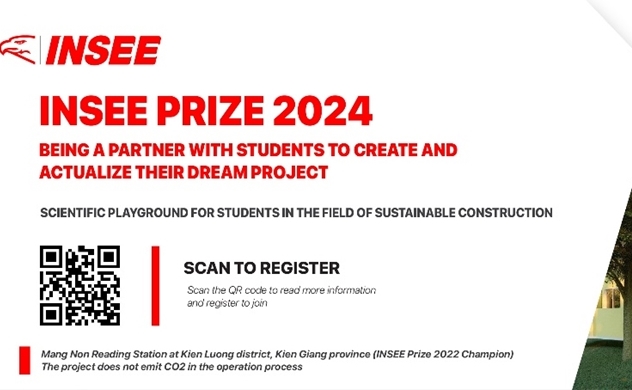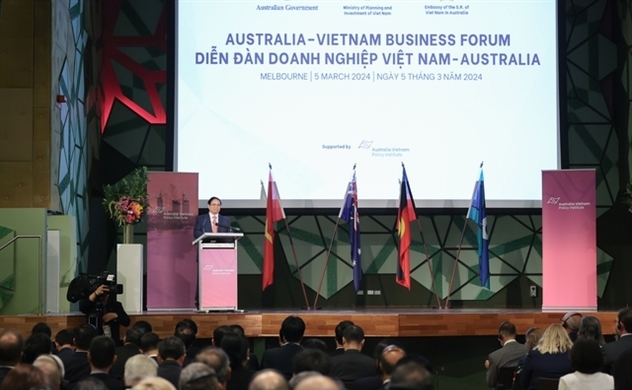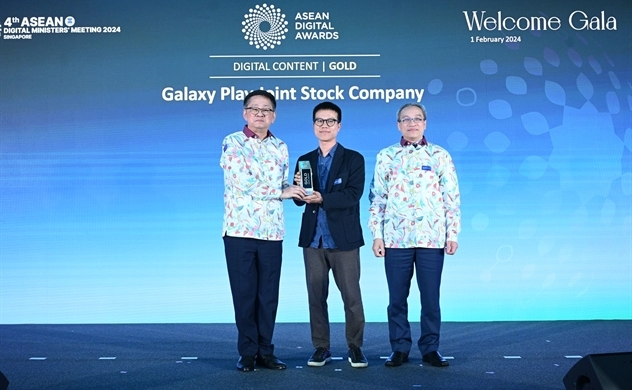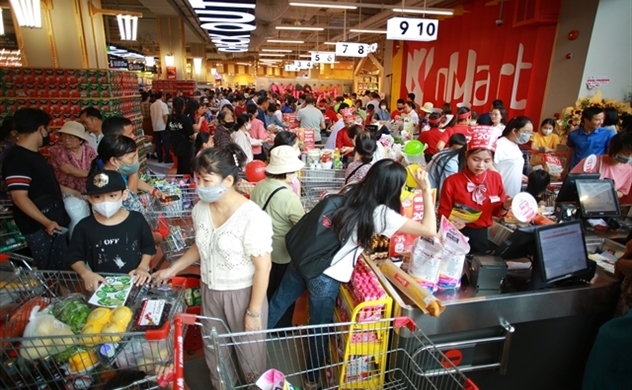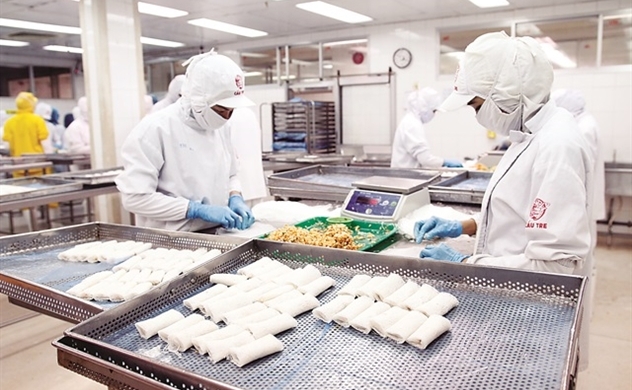Vietnam's consumer goods and retail industries undergo great changes
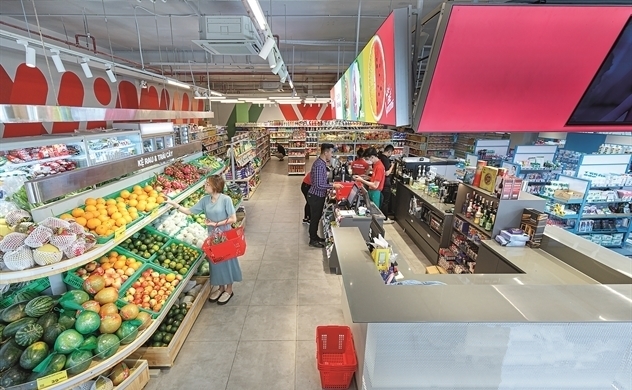
FMCG products are shifting strongly to the high-end segment. File Photo
Vietnam's consumer goods market remains attractive despite economic challenges and declining purchasing power. Orion, a leading confectionery company, has entered the dairy segment, partnering with Dutch Mill to penetrate the Vietnamese market.
The Thai dairy industry, which accounts for 70% of the market share, is expected to gain a foothold in the market, which has a size of over $5 billion, according to the Vietnam Dairy Association.
Landing in the high-end segment
 |
| Premium milk is the territory where all brands want more market share. Photo: Quy Hoa. |
Three leading dairy brands, Vinamilk, FrieslandCampina, and TH Food Chain, are launching products in the high-end segment, with Vinamilk offering organic fresh milk, Green Farm fresh milk, and bird's nest milk, FrieslandCampina offering Friso Prestige, and TH offering fresh milk supplemented with grains and high-grade yogurt.
The Cimigo report shows that nearly 6 million households in Vietnam have an income of $1,000 a month, a 378 percent increase over the past five years. This income increase is expected to lead to a higher middle class, with consumers becoming more aware of healthcare and willing to spend money on high-quality products.
Premium milk is a target for all brands, with New Retail CPG distributing Kabrita goat milk, a premium dairy brand of Ausnutria (Ha Noi). Good Food For Life, the founder and CEO of DeliFres, focuses on the high-end segment, avoiding competition and taking a "shortcut" compared to veteran competitors.
Other FMCG products, such as confectionery, condiments, food, and cosmetics, are also shifting to the high-end segment, with the largest consumer company in Vietnam, Masan, allocating high-margin products in the condiments and convenience food industries.
Premium products do not necessarily mean high prices or only for high-income people. Mai Kieu Lien, CEO of Vinamilk, emphasizes the intangible added value that each product brings to consumers, such as nutritional value or green, environmentally friendly products that promote sustainable development and reach more consumers.
Comply or disappear
Climate change and green living trends have led companies like Vinamilk to transform their production and business models. Vinamilk became Vietnam's first carbon-neutral dairy farm and factory, and 80% of Vietnamese consumers are willing to pay more for environmentally friendly products.
ESG (environment, society, governance) is becoming an important criterion for customers, with McKinsey's analysis showing that products with ESG claims experienced an average cumulative growth of 28% over the five years (2017–2022). Two-thirds of survey respondents are willing to pay 10% more for natural and organic products and are satisfied if they can remove trans fats and sugar from products.
Healthy food is forecast to be a potential field, with the global market for sugar-free foods and beverages estimated to grow at a rate of 9.53% per year between 2022 and 2027. In Vietnam, TH Group has continuously launched milk and beverages with reduced or no refined sugar, such as Vinamilk and DeliFrs.
Customer trends also require businesses to diversify products, with Masan's 2022 annual report revealing that its entire consumer portfolio can represent about 80% of consumer spending. Masan leaders believe that when urbanization rates reach 50% and per capita income increases, modern forms of shopping will account for about 30% of the market, increasing retail from the current 10%.
4P improvisation in the online world
Modern retail models have evolved to meet customers' convenience needs, with convenience being a key factor. Masan has implemented the Win store, a mini-mall model that integrates products and services from necessities, financial services, pharmaceuticals, F&B, and telecommunications. This has led to positive results, with revenue per m2 increasing by 20% and EBIT increasing by 0.6%.
Mobile World Investment Joint Stock Company (MWG) has also changed its strategy for the Bach Hoa Xanh chain, shifting from size to purchase frequency. The company is shifting demand from large supermarkets to mini-stores with increased frequency and shopping cart value. Bach Hoa Xanh is also experimenting with opening new stores at the foot of apartment buildings but will not step out of the provinces where it has stores.
Online shopping is a consumer trend, with 97% of adults having a smartphone, 79% accessing the internet, and 77% of non-cash transactions. Cimigo predicts that online shopping will become even larger than the $23 billion level by 2022.
Metric's e-commerce platform report shows that total revenue on e-commerce platforms increased by 46% year-on-year in the first half of 2023. TikTok Shop Vietnam's global campaign with the hashtag #Tiktokmademebuyit achieved 20 billion views and 66% of users decided to buy right in the campaign.
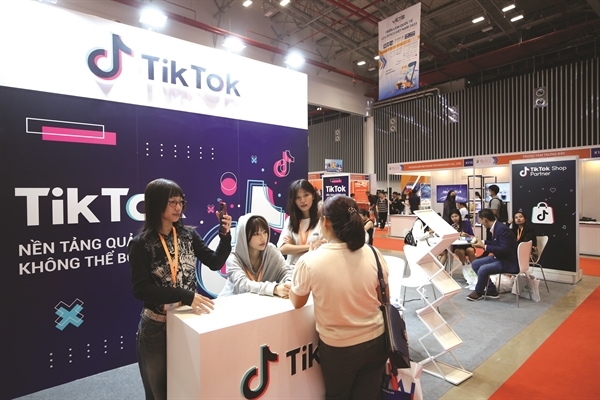 |
| Total revenue on e-commerce platforms in the first half of 2023 increased by 46% year-on-year. Photo: Quy Hoa. |
Online shopping has made it easier for merchants to implement a one-price policy, creating peace of mind for customers. In difficult times, consumers prioritize prices and often compare prices to find the best deals. Promotions, price offers, or refunds are considered ways to create a good customer experience.
A good customer experience focuses on satisfying multi-channel needs, increasing personalization, and remembering customer preferences. Companies that protect their personal data are more likely to trust companies. About 81% of businesses aim to increase their odds of being competitive by creating a great customer experience.
To build a smooth, consistent, and natural customer experience journey, businesses must integrate sales channels, optimize processes, avoid interruptions, and create seamless work. Technology is considered the key to this, as demonstrated by Masan's decision to buy back 25% of Trusting Social shares.
Advances in big data, machine learning, and artificial intelligence have helped Vietnamese businesses expand their ecosystem and transform digitally. With the compound growth rate of global cross-border e-commerce estimated at 26% per year in 2022–2030, Vietnam has the potential to reach a market size of about 300,000 billion dong after three years.
Hidden game changing numbers
In a newly released report, consumer trend forecasting company WGSN calls Vietnam a key growth market of the Asia-Pacific region (APAC) for brands and retailers in 2023. Vietnam's retail industry has a market size of $142 billion, forecasted to increase to $350 billion by 2025 and continues to be one of the potential areas.
With 100 million people and high growth in purchasing power, Vietnam's retail market is witnessing the arrival of many retail names around the world, making competition increasingly fierce.
“Doing business in a flat world, what is the meaning of the human element, how should it be developed in the context of many technologies, especially artificial intelligence, which has the potential to replace people in the world? a lot of work”, said Ms. Thoa Nguyen, Communications Director of PMI Company, in the competition between many consumer and retail brands.
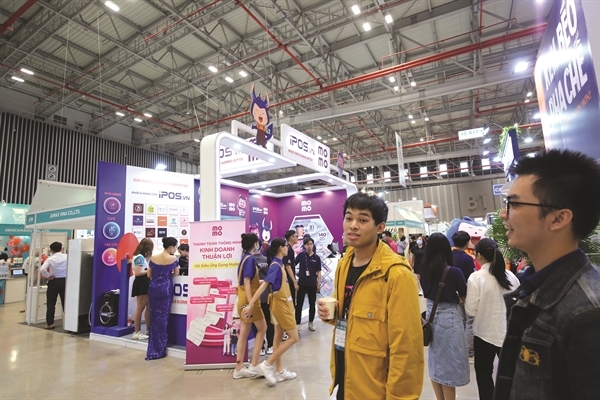 |
| Vietnam's retail market is witnessing the landing of many retail names around the world. Photo: Quy Hoa. |
Technology can help people perform tasks more efficiently and cost-effectively, but it also has the potential to replace people in many fields. The future of work is not solely about technology and tools but also about management methods, novelty, and sensitivities in the workplace.
Gen Z, born in the digital age, is a significant factor in the future of retail and consumer goods use. They have influenced culture, traditions, online entertainment, travel, shopping, news, and education, creating challenges for brands.
In Vietnam, the "silver generation" (over 50 years old) is the largest segment, with 36% of the population being over 50. This generation is still working, has a higher-than-average income, prefers independence, and lives an active lifestyle.
Cimigo's research highlights the importance of this consumer segment and the role of women in the future. By paying attention to these needs and decisions, businesses can seize new opportunities in expanding fields.
Same category news
-
Hoàng Kim
Latest news
-
Huyen Hoang

 TIẾNG VIỆT
TIẾNG VIỆT _291615658.jpg)
